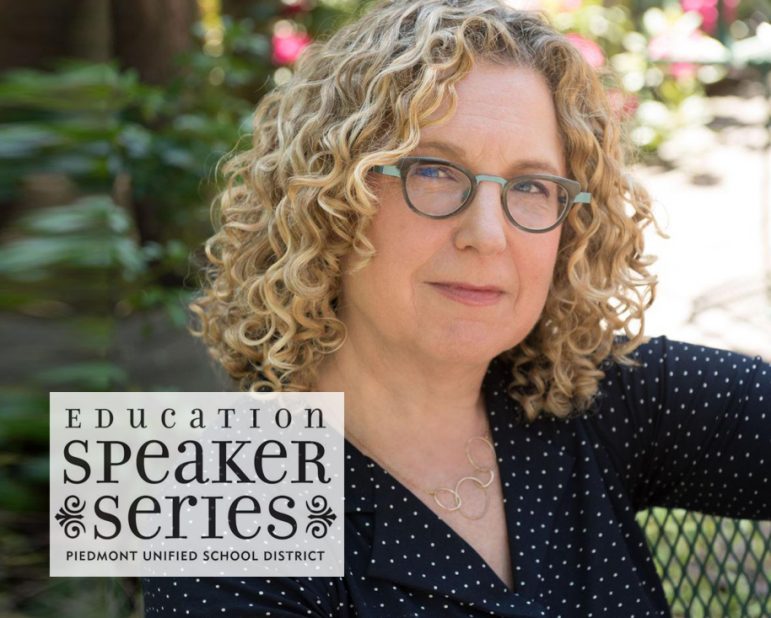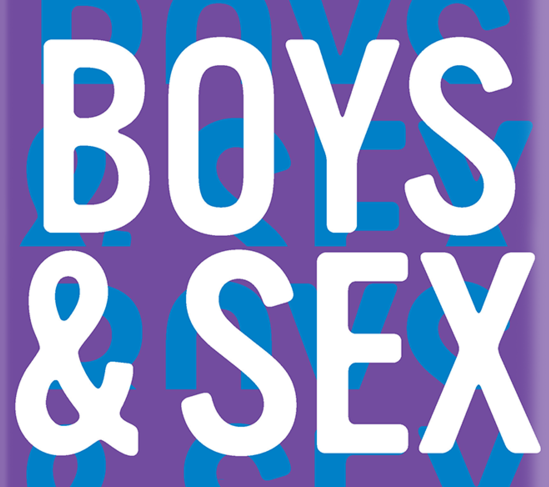East Bay resident and author Peggy Orenstein addressed the challenges of raising boys in a hyper-sexual world where porn and hook-up culture dominate the cultural landscape at a talk hosted by the Piedmont Education Foundation on Tuesday night.
Based on her decade of research interviewing high school and college-age boys and her New York Times bestselling book, Boys and Sex, Orenstein covered boys’ relationship with their emotions, hook-up culture, porn, and consent and offered Piedmont parents suggestions and tools for raising young men to be good “sexual citizens.”
Orenstein prefaced her talk by praising the sexual education programming in place in Piedmont, including PHS teacher Kim Taylor’s and educator Natasha Singh’s work around consent in schools and through the recreation department. She proceeded to tailor the conversation to the Piedmont community by drawing on local examples of sexual misconduct by boys including the Fantasy Slut League at Piedmont High School in 2012 and more recently the Piedmont Protector’s Instagram account which revealed the extent of sexual harassment and assault at Piedmont High School.

Orenstein encouraged parents to have important conversations about sex and pornography before they turn 18. “Porn is the de-facto sex education,” said Orenstein. She presented research that found boys over the age of eighteen look to porn for how to have sex, but boys seventeen and younger look to their parents for guidance.
She pointed out that like any media, porn influences and has an impact on viewers, and that media literacy is important in understanding porn’s impact. Pornography both presents women as playthings for men and normalizes very aggressive sexual acts. She suggests parents talk to their kids about the images found in porn and discuss what is real and what isn’t. Orenstein found that we’ve done a much better job teaching girls media literacy and we need to be doing the same with boys especially in regards to porn.

Orenstein told listeners that culture and media encourage boys to treat sex as a “status-seeking activity.” She argued that it is this view of sex that can lead to mistreatment of girls, as happened in the Fantasy Slut League, an incident where male Piedmont High School students organized a game in which they earned points for sexual activities with female students. To combat this view, Orenstein suggests parents consider raising boys to be “sexual citizens”, as one would raising a good citizen in any other aspect of life. “Sexual citizenship is the right to recognize your own sexual determination and sexual determination in others,” said Orenstein.
Orenstein also argued that boys are “systematically disconnected from their hearts.” From a young age, boys are not given the opportunity to express and understand their emotions; they are only given the space to be either happy or angry. The boys Orenstein talked to for her book see masculinity in opposition to femininity and feel the need to constantly police their masculinity by repressing their emotions. When boys do feel comfortable opening up, they tend to only do so with their mothers or female peers. “Moms — don’t process their emotions for them,” warned Orenstein, “this can lead to women being forced to do emotional labor for men.” She emphasized the key role of fathers in modeling a full range of emotions for their sons.
Orenstein also broke-down “hook-up culture” which dominates today’s youths’ sexual world. “Hook-up is an ambiguous term that can mean anything from kissing to sexual intercourse,” said Orenstein. “The ambiguity of the term allows kids to overestimate their peer’s sexual experience.”

Orenstein found that hook-up culture is dependent on alchohol, which can lead to sexual assault. Orenstein thinks it’s crucial for boys to understand the effects of alcohol on them, especially in a sexual context as “alcohol reduces boys’ ability to hear ‘no’ and therefore makes boys vulnerable to assaulting someone.” A more complex understanding of sexual assault is crucial for boys — they need to understand that good guys can do bad things, she said. Orenstein recommends that parents talk with their sons about hook-up culture, alcohol’s effects, and the complexities of sexual assault.
“It’s not about ‘The Talk,’ but about a lot of little conversations about sex, consent, the media, and gender dynamics” concluded Orenstein.
This event was part of the Piedmont Education Foundation’s Education Speaker Series. Resources for talking to your child about sex can be found on the author’s website HERE
